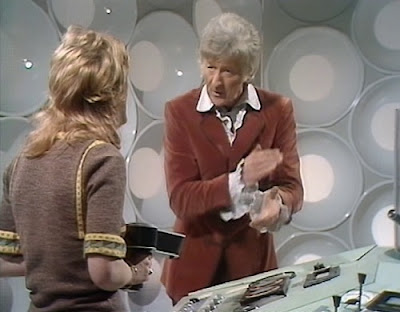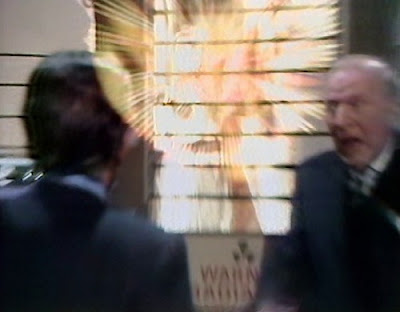Lakis warns the Doctor, so he runs straight into the labyrinth to help Jo. Hippias fights with the minotaur until he gets thrown through one of the many mirrors they have about the place for some reason - possibly to try and make the studio look bigger than it is. When the Doctor meets the minotaur he does a komedy bullfight with it until it charges through a wall and goes
The Doctor and Jo reach the crystal of Kronos, but then Krasis comes in with his guards, captures them and takes them to the Master, who has, since we last saw him, usurped the place of King Dalios with the help of Queen Galleia. But there is trouble in paradise for the Master, as after he has sent the Doctor and Jo to the dungeons, he has a row with Galleia over which of them is really in charge:
The Master: "You must learn to obey, my love, to do my will. To carry out my commands without question, like a soldier."Galleia: "You mean like a servant girl? Then you must learn, my love, that Galleia is a queen."
In the dungeon, the Doctor tells Jo a story about "the daisiest daisy" he ever saw. It would appear at first to be revealing a previously unseen side to the character of the Doctor and his backstory from long before the series began, but when Jo laughs at the story he lets slip that he is only telling her a story he himself "heard" as though it had happened to him - so although it tells us something about the Doctor, it is what makes him the sort of character who would tell that tale to a despairing Jo to lift her spirits, not about what once happened to him in the long past.
The plot resumes when Dalios is thrown in the dungeon with them and is struck by a guard. We saw in part five that the mannys of Atlantis were near to the point of revolution, but the guard expresses such hatred for the recently deposed king that it must have been a powder keg awaiting a spark when the Master and the Doctor arrived. Dalios puts his trust in the Doctor and Jo before he dies in their arms.
The Doctor and Jo are taken to the court where they almost immediately reveal the fact of Dalios's death to Galleia, which turns her against the Master when he is forced to admit it. Before she can have the Master arrested, he gets Krasis to switch on TOMTIT (now upgraded with the larger crystal) to summon Kronos.
Kronos flies about wrecking both the set and the Master's plan. Jo tries to wrestle with the Master, but he takes her and the crystal into his TARDIS and dematerialises. Galleia frees the Doctor so that he can follow in his own TARDIS.
The Doctor threatens to deliberately time ram the Master's TARDIS, an eventuality that was cleverly foreshadowed back in part four when it was something the Doctor wanted to avoid doing by accident. But after only a moment's hesitation the Master dares him to do it, calling the Doctor's bluff and knowing that he might sacrifice himself but never Jo. So it is up to Jo to act, and she saves the day by forcing the time ram from the Master's TARDIS.
Jo and the Master are knocked out, and when Jo wakes up first she goes across a void consisting of some extremely fringing-heavy CSO (making this sequence even more trippy than it would have already been) to the Doctor's TARDIS. She thinks they are both ded and that this is the afterlife, but instead of a waiter played by Jack May it is the giant CSO face of Kronos they meet.
When Jo questions why her appearance now is different from the flappy birdy Kronos of earlier, she replies
"I can be all things. A destroyer. A healer. A creator. I'm beyond good and evil as you know it."
This short speech places Kronos firmly in the category of being one of the most titanic beings in Doctor Who, and this scene is a suitably epic-level climax to the story. The time ram released her, and in gratitude Kronos offers the Doctor and Jo a wish - they are both wise enough to only wish to be able to go home.
Kronos plans to keep the Master here, for
"Torment, of course. The pain he has given so freely will be returned to him, in full."
The Master comes out of his TARDIS and begs for mercy, so the Doctor asks Kronos to release him as well. When she does so, he escapes back to his own TARDIS and leaves. The Doctor had hoped to take him back to Earth with them as a prisoner, but Kronos, in true wish-granting style, says
"You asked for him to be given his freedom: he has it."
We haven't seen anything of the characters left behind on Earth for two whole episodes, but now we go back to see Ruth and Stuart (and baby Benton) still trying to reverse the time-freeze effect on the Brigadier and his soldiers. The Doctor and Jo arrive just in time to see them finally succeed, but then their machine blows up with a disappointingly small explosion - especially coming after Stuart built it up with a dramatic cry of
"Everybody get down, it's going to go up!"
The Brigadier bursts in and demands to know what's going on in this denouement:
Brigadier: "Right, stand quite still, everyone. Er, where's the Master?"Doctor: "A very good question, Brigadier."Brigadier: "Doctor, glad to see you're back. Miss Grant, what on Earth are you doing in that extraordinary get-up? And where, for heaven's sake, is Sergeant Benton?"
His question is answered, and the episode, story, and season ends with everyone laughing at the fact that Benton has been restored to normal... but with no clothes on.
What's so good about The Time Monster?
As usual for any story with Roger Delgado in it, he's a large part of what makes it so good, though as with The Dæmons this is an ensemble piece with all of the regulars contributing their part to its success.
The Time Monster is a very light story which makes for an easy and fun viewing experience. There are probably more komedic moments than is typical for Doctor Who (and certainly for the Jon Pertwee era up to this point) but even the more dramatic moments are played with a lightness of touch that stops them from being so dark they clash with the komedy. Jon Pertwee deserves a lot of the credit here, his central performance as the Doctor walking the line between taking the plot seriously and winking to the audience.
You do get the sense that the cast and crew had fun making the show, from the Doctor speeding up the film to make Bessie go faster, to the Master's irritation at being outwitted by Benton (twice), to the Brigadier's 'oh FFS' face at the Doctor's invention made out of Stuart's odds-and-ends. On top of that, there's a surprising amount of innuendo in this story, enough that it surely can't be coincidence and the show's makers must have been in on it - from the shape of the Doctor's time sensor, to the Master's repeated shouting of "come, Kronos, come!" through to the final shot of Benton, with the implication that the other characters are all looking at his willy.
There's even a cat in episode five - I mean, what more could a viewer ask for? This is a great story.
Pertwee Six-Parter Padding Analysis
Just as was the case with The Sea Devils, the presence of the Master can cover up a lot of plot padding, keeping the show watchable in the knowledge that viewers will find it fun seeing his interactions with the Doctor or, when the Doctor is elsewhere, just watching him going about hypno-eyesing mannys and being generally villainous.
The difference between this and previous six-part Master stories is that here the padding is highly concentrated - we are treated to almost two entire episodes of continuous padding. From the Master saying to Krasis 'get in, loser, we're going to Atlantis' about halfway through part three, to them actually arriving at Atlantis near the start of part five, the main plot of the story advances not a jot, save that the concept of "time ram" is introduced, so that it is not a complete saturn ex tardisa when suddenly used in part six.
But we do get some excellent scenes in amongst this padding, including some of the most fun and enjoyable of this whole fun and enjoyable story - the Doctor and the Master one-upping each other from their respective TARDISes, and in front of their respective Companions, is a highlight - and it would have been a shame to miss out on these, as would have undoubtedly been the case if this had been only a four-parter.



















































